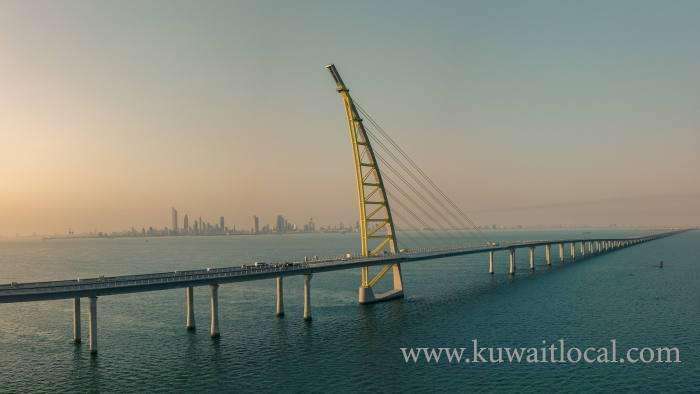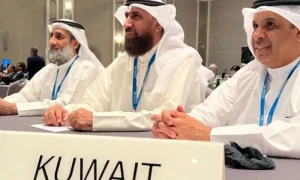Latest News
- Court Sentences Bank Employee To 5 Years For Embezzling 100,000...
- Fake ‘Sheikh’ Sentenced To 2-yr As Court Overturns Verdict
- Justice Ministry New Service On The Sahel App
- Ministry Probes 68 Cases Of Illegal Charity, Funds Collection
- Globally, Kuwait Is Among The Top Consumers Of Incense And Oud O...
- Decrease Seen In Foreign Investment
- Kuwait Customs Seized 2 Containers Laden With Tobacco At Shuwaik...
- Unpaid Salaries, Accountant Beaten Up By Workers
- The Sahel App Was Not Hacked, A Spokesman Claims
- Four Expats Arrested For Stealing Copper Cables Worth 60,000 Din...
- Indian National Died In Abdalli Car Accident
- Work Permits And Foreign Worker Transfers Are Amended By PAM
Kuwait Is Spending Its Way To A New Direction

Rising above the waters of the Bay of Kuwait, a towering yellow arch forms a new national landmark on the 36km Sheikh Jaber Causeway, before the bridge veers off to connect the capital to the north.
But the fourth-longest causeway in the world promises much more than cutting down the commute from Kuwait City to the sparsely populated regions bordering Iraq. The grand infrastructure project epitomises the wealthy Gulf state’s commitment to forging a new future for itself.
For decades, Kuwait’s 1.4m locals, whose country sits on the world’s fourth-largest crude reserves, have benefited from generous state care.
Excess resources have been channelled into a nearly $600bn sovereign wealth fund, providing financial ballast for future generations. The government hopes to push ahead with reforms to diversify an oil-dominated economy exposed to the vagaries of commodity markets as nationals call for better public services, creaking after years of under-investment.
Kuwait has pledged to partner with the business community, earmarking $100bn for infrastructure investment. It is opening up to foreign investors committed to creating jobs for Kuwaiti nationals, who make up only 21 per cent of workers in the private sector. “The coming generations understand that their future cannot be built in the same old way, and you will see more movement into the private sector,” says Khalid Mahdi, Secretary-General of Kuwait’s Supreme Council for Planning and Development.
Transforming Kuwait’s labour force from government bureaucrats into entrepreneurs will not be easy. Recent attempts to reduce subsidies and limit benefits of public sector employment have met with resistance from the local population, fanned by parliamentary opposition.
Red tape hampers business decision-making and project overruns are so common that local wags joke Kuwait is the only country in the world where it takes 18 months for a baby to be born.
The causeway, which is due for completion later this year on time and on budget, hopes to counter such caricatures. “This is one of our biggest projects and provides solid proof that, although we have institutions with laws and a bureaucracy chasing routine approvals, we managed to finish at cost,” says Ahmad al-Hassan, managing director of the Public Authority for Roads and Transportation, who has been overseeing the causeway’s execution.
Rindala Beydoun, managing partner at BonelliErede Middle East, says optimism surrounds the latest project plans and successful efforts to attract foreign investment, including from companies such as Huawei, the Chinese technology company, and GE, the global conglomerate.
But the Gulf state’s history of stop-start reform and tardy project development sustains concerns about the its ability to push through legal changes to ease business procedures and open up the economy.
The International Monetary Fund identifies reform and project delays as major risks to the country’s outlook, alongside lower oil prices and regional security challenges.
“Kuwait’s quasi-democracy with a very active national assembly has many times paralysed the advancement of projects, which can be put on hold for years,” says Ms Beydoun.
Planners are seeking to start afresh with a grandiose new development. “Kuwait is tied in a Gordian knot,” said a Kuwaiti lawyer involved in drafting new legislation. “The people and parliamentarians are preventing any real chance for real change — so it makes sense to start over in the north, which will allow us to show the country what can be done if we take radical steps.”
The coastal areas of northern Kuwait, including Boubiyan Island, mark the country’s border with Iraq. There, the government has outlined a vision for a multibillion phased development of the 250 sq km Silk City & Islands Zone, including a major port, an airport, a nature reserve and tourism facilities.
Some scepticism surrounds the plan, one of several across the Gulf where ambitious leaders’ mega-project proposals can come unstuck over financial or political hurdles.
Driven by the emir’s son and defence minister, Sheikh Nasser Sabah Al-Sabah, the idea is rooted in the idea that it could potentially become a maritime terminus on China’s Belt and Road Initiative, intended as a global transport network.
China and Kuwait signed bilateral agreements proposing investments in the Gulf state during Emir Sheikh Sabah Al-Ahmad Al-Jaber Al-Sabah’s visit to China in July.
One of Silk City’s selling points is its proximity to Shia-led Iraq and Iran, with which the rest of the Sunni-dominated region has difficult relations.
Kuwait, which is a close ally of the US and has mediated the Saudi-led embargo of neighbouring Qatar, wants to parlay its neutral stance into that of a trusted trade partner.
“Kuwait during its history has always been a hub for geopolitical, economic and security reasons,” said Mr Mahdi. “We are a link between the maritime and the land, and this explains the interest in One Belt, One Road.”
Long since eclipsed by the entrepot of Dubai, Kuwait is considering a new legal structure for the economic zones near the Iraqi border, freeing the area from restrictive onshore laws.
“Geopolitically, there are some interesting opportunities that could be developed if the government liberalises the business and trade environment,” said Tarek Sultan, chief executive of Kuwait-based logistics company Agility. “There will be lots of openings if it [the government] comes up with an encouraging law for the new zone, and then thinks about getting the private sector to do more of what the government does.”
The people and parliamentarians are preventing any real chance of real change
Options include 100 per cent foreign ownership rules, relaxing labour laws and even breaking long-held taboos such as serving alcohol. Such liberalisation would no doubt be controversial in Kuwait’s conservative Islamic society.
A former government official now in the private sector fears the costs related to the project threaten the social contract through which the state provides a comfortable life for its citizens.
He also fears it will cede control to China, which is limbering up to fund the project. “This is going to cost a lot of money,” he said. “The people have their doubts and see it is a money making scheme for the big families, which will corrupt the country.”
Abu Abdullah, a retired engineer, shares widespread concerns about opening up the country. But he says attracting global partnerships trumps parochial prerogatives. “For the future security of Kuwait, we must set aside such
SOURCE : FT
Trending News
-
 Eid Al Fitr 2024: Crescent Moon Not Sighted In Sau...
08 April 2024
Eid Al Fitr 2024: Crescent Moon Not Sighted In Sau...
08 April 2024 -
 Kuwait Implements Home Biometrics Services Ahead O...
14 April 2024
Kuwait Implements Home Biometrics Services Ahead O...
14 April 2024 -
 When Will Eid Al Fitr 2024 Take Place In Qatar, Ba...
08 April 2024
When Will Eid Al Fitr 2024 Take Place In Qatar, Ba...
08 April 2024 -
 On Sunday, The Meteorological Department Warns Of...
07 April 2024
On Sunday, The Meteorological Department Warns Of...
07 April 2024 -
 Kuwait Airways Provides Update On Flight Schedule...
14 April 2024
Kuwait Airways Provides Update On Flight Schedule...
14 April 2024 -
 Kuwait Airways Introduces Convenient Home Luggage...
15 April 2024
Kuwait Airways Introduces Convenient Home Luggage...
15 April 2024 -
 Gathering For Eid Al-Fitr Prayers: Kuwaiti Citizen...
10 April 2024
Gathering For Eid Al-Fitr Prayers: Kuwaiti Citizen...
10 April 2024 -
 Winners Of Kuwait National Assembly 2024 Elections
06 April 2024
Winners Of Kuwait National Assembly 2024 Elections
06 April 2024 -
 Bay Zero Water Park Kuwait: Summer Season Opens Ei...
11 April 2024
Bay Zero Water Park Kuwait: Summer Season Opens Ei...
11 April 2024 -
 An Egyptian Expat Dies At Kuwait's Airport
11 April 2024
An Egyptian Expat Dies At Kuwait's Airport
11 April 2024












Comments Post Comment